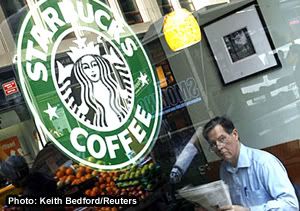How Starbucks Saved My Life
But the fact that it may look like more of a Starbucks coffee table book than an autobiography doesn't mean it's all commercial inside, surprisingly, I personally felt that the approach of writing comes from the author's heart and not from the head of Starbuck's PR is Seattle WA. So to best put it in words for the author's defence, the book did not make me feel that it's a promotional puppet channelled through a heartfelt memoir.

Michael Gates Gill, is the son of a famous New Yorker critic Brendan Gill. He grew up in a 35-room mansion and had enjoyed attention and work other people does for him as child, for example, a manpower team fork-lifting his grand piano through the upper level of their home. His later years saw Gill graduating at Yale University and immediately topping a “high powered” advertising position at the J. Walter Thompson agency (With the help of a friend, emphasizing the author’s superb social connections) in New York, the biggest and advertising agency in the world (JWT pioneered the first TV commercial, use of layouts and copy etc). His high positioned living may best be described by noting that he has mingled business with Jacqueline Kennedy and Queen Elizabeth II, the latter made the Prince of Edinburgh annoyed after Gill accidentally bumped the queen's flawless arm.

Gill lived a life of “privilege” that many strive for. However, after 25-years of service for JWT, he was fired by a relatively ’new’ advertising agent whom he was the one responsible hiring. He started a failing business, and got divorce, he realizes he can no longer afford the life he once led. Depressed, scared, and lost, he walks into a Starbucks to sip a latter and was accidentally offered a job, he says, a job that “saved” his life.
The transition is quite fast-paced and reading the book might not give the impression that it happened through decades, Gill’s book illustrated how cleaning bathrooms, serving lattes, and working with people from different walks of life brought him happiness. He achieved this goal during the scenes where we saw him in the store—interacting with his partners (this is how they call the baristas) and learning the job. The book showed a brave articulation of how the author, a white American, had directly and indirectly practiced racism and classism in his old days, something Gill might have expected criticisms for, but still courageously jotted it down on his memoir to share a sincere personal regrets and teach its potential readers (in this case Starbucks customers, class A's and upper B's) obvious lessons.
Mainly his relationship with a black colleague Crystal (the manager who offered him the job) revitalizes both Gill and the reader. As his boss, believed in and encouraged him to do what he never thought he could—like being a cashier. In turn, he helps her plan presentations (with the skills he learned in advertising) and helps her laugh. The genuine and honest account of this relationship is as touching as it is convincing; we believe that Crystal could have aided Gill towards a kind of “rebirth” he describes.
The ending of the book is quite fair, with no "lived happily ever after" tagline, rather a humble continuity of Gill on being a Barista, even after the book was published, and even after the call of Tom Hanks, saying that he wanted to portray the role and produce the film adaptation (to be released 2008).
The style of his writing on the book is relative to how the movie "La Mome" interpreted Edith Piaf's life. The storyline often jumps from different decades, recalling past happenings as the present unfold, realizing regretful choices from the past. I saw 5-8 grammar/spelling errors, which is not a big deal and kind of give me a feel that I am reading a book written by the author and not by a big time New Yorker editor.
I am expecting a big boom on the sales of this book, especially in the Philippines where Starbucks is a big deal. (As a genuine ICT practitioner myself, I easily get annoyed of those people who uses their laptops inside Starbucks doing nothing except browsing their files or doing non-sense on paintbrush, trying very hard to look techie and rich. The hell?)
Metro Manila can buy the book at Power Books, Fully Booked and Page One.
My Rating:
This post is a review post from my Angel's Hub Reviews via Multiply.

















0 Comments:
Post a Comment